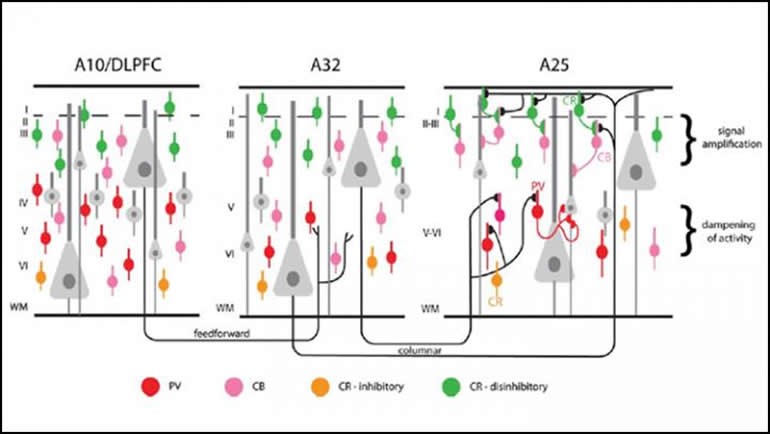Tuesday, 9 March 2021
Two very different approaches to identify functional connections between brain areas
 Two recent studies have shown yet again that many more different parts of the brain are often involved in a given mental phenomenon than was once believed. In the brain, nothing is really isolated, and there are no “centres” of anything. Instead, we’re always dealing with multiple interconnected areas of the brain that form networks as demanded by the situations faced or the tasks to be performed. What’s most interesting about these two particular studies is that the researchers used two very different approaches to identify functional connections between brain areas: in one study, they visually traced the path of the axons projected by certain neurons, while in the other, they used genetic methods to isolate a new kind of membrane receptor. (more…)
Two recent studies have shown yet again that many more different parts of the brain are often involved in a given mental phenomenon than was once believed. In the brain, nothing is really isolated, and there are no “centres” of anything. Instead, we’re always dealing with multiple interconnected areas of the brain that form networks as demanded by the situations faced or the tasks to be performed. What’s most interesting about these two particular studies is that the researchers used two very different approaches to identify functional connections between brain areas: in one study, they visually traced the path of the axons projected by certain neurons, while in the other, they used genetic methods to isolate a new kind of membrane receptor. (more…)
Emotions and the Brain, Memory and the Brain | Comments Closed
Monday, 3 December 2012
Your Brain Likes Nature Better Than E-Mail

In the early summer of 2010, five neuroscientists spent a week all on their own, rafting and camping along the San Juan River in a remote area of southern Utah, in the United States. Nothing so special about that—plenty of people make these kinds of wilderness expeditions nowadays.
What made this adventure different was that these scientists gave themselves two additional challenges. Knowing that workaholism tends to come with their profession, they decided to spend the entire week without their cell phones and laptop computers. And being neuroscientists, they decided to observe their own reactions to this deprivation and thereby try to shed light on their own hypotheses about how daily use of these technologies may be changing the ways that people think and behave. (more…)
The Emergence of Consciousness | Comments Closed
Monday, 28 May 2012
Playing Chess at School Improves Learning
 According to America’s Foundation for Chess, an organization that promotes the use of chess in the schools, this age-old game is an ideal learning tool. When children are around age 8 or 9, the brain’s analytical abilities are developing rapidly, and playing chess seems to stimulate this development. In any case, studies show that children who play chess do better in most of their school subjects. (more…)
According to America’s Foundation for Chess, an organization that promotes the use of chess in the schools, this age-old game is an ideal learning tool. When children are around age 8 or 9, the brain’s analytical abilities are developing rapidly, and playing chess seems to stimulate this development. In any case, studies show that children who play chess do better in most of their school subjects. (more…)
Memory and the Brain | Comments Closed







